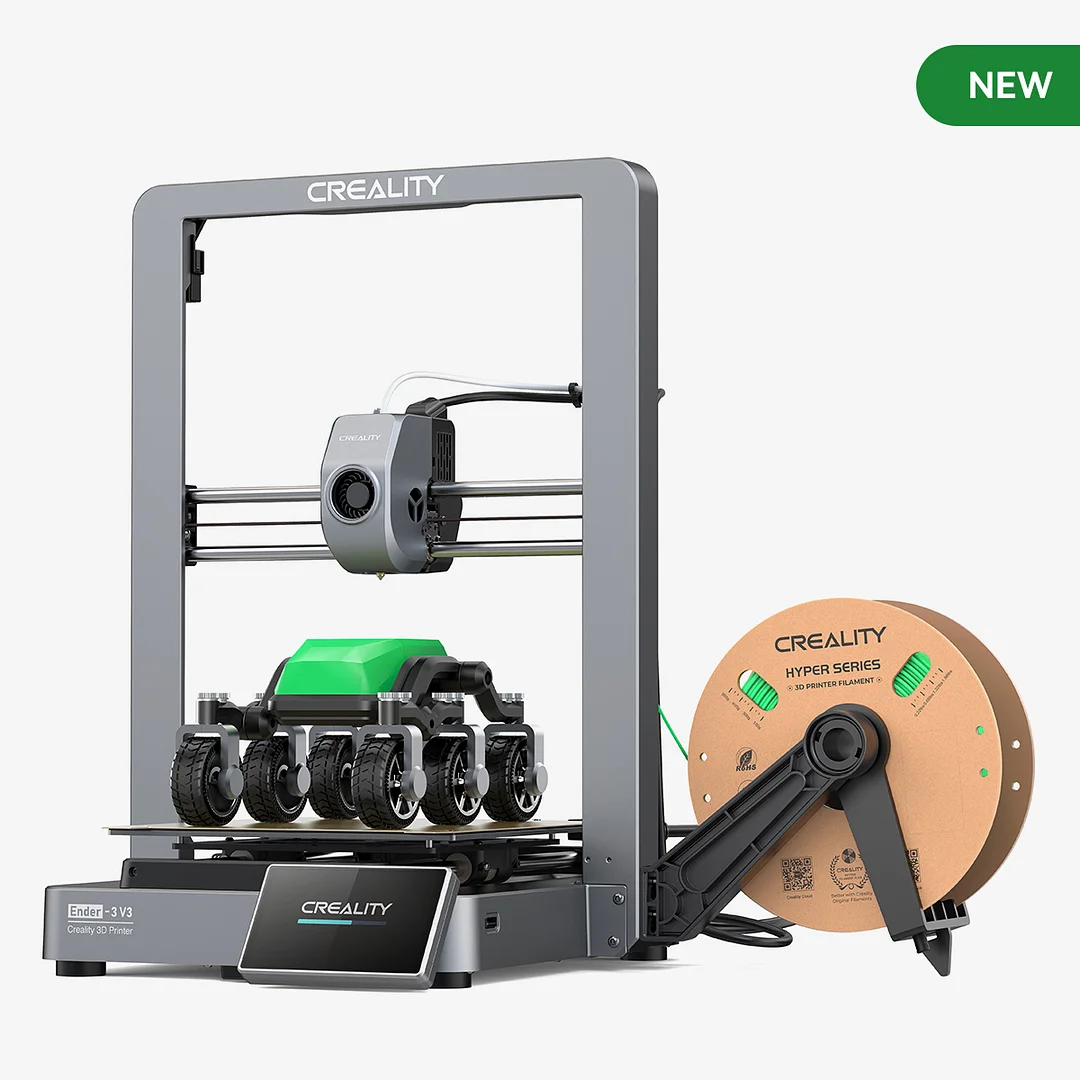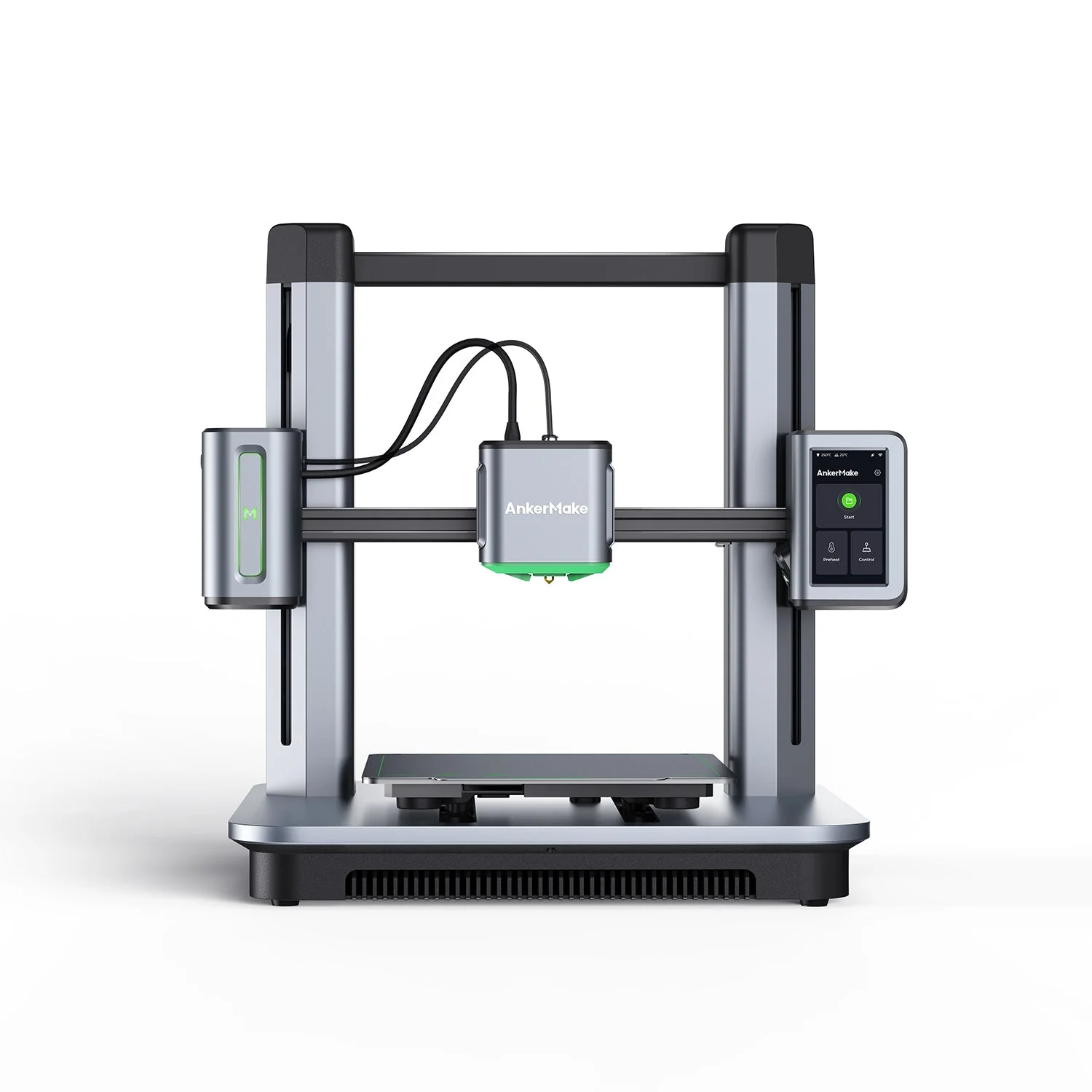Compare Ender 3 V3 vs M5
Comparison between the best 3D printers
Choose the best 3D printer at the best price. The cheapest 3D printers are here.
Buy a 3D printer here with 3D Fila.
 |
 |
|
| Model | Ender 3 V3[BUY Ender 3 V3] |
M5 |
| Printing Material | Filament | Filament |
| Buy Filament for Creality Ender 3 V3 | Buy Filament forAnkerMake M5 | |
| Estimated price | $389,00 | $497,00 |
| Manufacturer | Creality | AnkerMake |
| Release Year | 2024 | 2023 |
| Print Volume [mm] | 220x220x250 | 235x235x250 |
| Printer Size [mm] | 358x374x498 | 502x438x470 |
| Weight [kg] | 7,12 | 12,6 |
| Power Loss Recovery | YES | YES |
| Enclosed printer | NO | NO |
| Bed Leveling | Automatic | Automatic |
| Filament End Sensor | YES | YES |
| Bed type | Heated | Heated |
| Power supply system | Direct Drive | Direct Drive |
| Standard nozzle | 0,4 | 0,4 |
| Maximum Nozzle Temperature [°C] | 300 | 260 |
| Maximum Bed Temperature [°C] | 110 | 100 |
| Maximum printing speed [mm/s] | 600 | 500 |
| Filament holder | YES | YES |
| Camera for supervision | NO | NO |
| Recommended filaments | PLA, PETG e TPU (95A+) | PLA, PETG, ABS |
| Recommended slicers | Creality Print, Cura 5.0 ou superior, Prusa Slicer e Simplify3D | AnkerMake Studio (macOS, Windows), Simplify3D, Ultimaker Cura, PrusaSlicer |
| Maximum Resolution [mm] | 0,01 | 0,1 |
| Processor | 32 Bits | |
| Display | 4.3" HD touch screen | Touchscreen 4,3'' |
| Power Supply | 350 W | 350 W |
| Connectivity | USB drive, LAN, Creality Cloud APP | Wi-Fi, USB-C, OTA Upgrade |
| Operating systems | Windows, Linux, Macbook | Windows, Linux, Macbook |
| Date of registration in the system | 2024-03-01 | 2024-07-08 |
| Release date | 2024 | 2023 |
| Extra features | The Ender 3 V3 redefines 3D printing with its CoreXZ system, reaching speeds of up to 600mm/s, and stable metal construction with cast parts. It stands out for its powerful direct extrusion, quick-change tri-metal nozzle, and two powerful fans for instant cooling. Equipped with automatic calibration, it makes leveling and adjustments easy, promoting a fast and reliable printing experience with various materials. | The AnkerMake M5 printer stands out for its impressive print speed, reaching up to 500mm/s. It features AI print monitoring, an integrated camera for creating timelapses, auto-leveling bed with pressure sensor, direct extruder, flexible PEI-coated build plate, and Wi-Fi and USB-C connectivity. Assembly is quick and easy, and the printer is designed to deliver high print quality and ease of use. |
| Support for multiple colors and materials (AMS and CFS) | NO | NO |
Notes * |
||
| Cost-benefit | 7 / 10 | 7 / 10 |
| Hardware | 3.2 / 10 | 3.5 / 10 |
| Tela | . | . |
| Print volume | 3 / 10 | 3 / 10 |
| Performance | 5 / 10 | 4 / 10 |
| [BUY Ender 3 V3] |
Conclusion |
| In comparing the Ender 3 V3 and the AnkerMake M5, both 3D printers present impressive features that cater to different needs. The Ender 3 V3 offers a slightly lower price point, making it a more budget-friendly option while still delivering exceptional print speeds and a robust build quality. Its focus on high-speed printing capabilities, combined with automatic bed leveling and an efficient cooling system, positions it as a strong contender for those seeking both performance and value. On the other hand, the AnkerMake M5, while more expensive, brings advanced features such as AI print monitoring, an integrated camera for timelapse creation, and flexible connectivity options, including Wi-Fi and USB-C. These enhancements, along with automated bed calibration and a user-friendly setup, make it particularly appealing for users who prioritize ease of use and innovative technology in their printing experience. Ultimately, the choice between the two printers will depend on individual preferences and budget considerations. The Ender 3 V3 excels in affordability and high-speed performance, making it suitable for users looking for a reliable and efficient printer. Conversely, the AnkerMake M5 may justify its higher price with its additional features and usability enhancements, catering to those who desire a more automated and versatile printing solution. Both printers rank similarly in terms of overall cost-benefit, suggesting that each can be a worthy investment based on specific user needs. |

